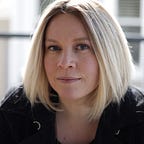White Folks Let’s Honor Black History Month by Dismantling Our Whiteness
I don’t know about you but my whiteness shows up every day. Every. Single. Day. This is my lived truth and I will continue to labor to pause, correct and undo the ways I have been socialized to be. I’m not making excuses — I’m being real. On this journey I must take ownership for my wrongs and do better in my next breath.
It is Black History Month and if we live in White skin, we may be contemplating how we can do better and raise Black (and Brown) voices not only this month but every day of every month of each year moving forward. We may be struggling with how we also celebrate Black History Month without being performative. Well, maybe we need to simplify it — “just don’t be performative.”
I know people are saying it is popular and trendy to be anti-racist (and, if you are just joining the journey you may be a little late to the station) but get on the train and don’t get off. Every soul is needed, all butts in the seat and hands-on deck. Though, if we get off and on at our convenience, our actions speak that we have no regard for the lived experience of our fellow humans living in dark skinned bodies. This is when our anti-racist and racial healing journey is performative. So, let’s not be performative — everybody makes mistakes but let’s not be fake.
Keep showing up in March, April, May, June, etc. and recognize there is a consequence when being anti-racist.
Have resolve that the consequences are worth it. We are not performative when we consistently show up and each time, we show up better than we were the day before. We can get so caught up in the narrative of being the “perfect” ally, perfect White person that we forget that’s our whiteness — striving for perfection. And, ultimately, perfection is not the goal because this very thinking is in a word — unrealistic. There’s no such thing.
Let’s speak hard truths and not shy away from the mistakes we will inevitably make. Let’s sit with humility when it is unveiled to us where we were “off base,” how we had not intended to do harm but we did and then own it. Let’s reflect, pause and sit with our nervous selves and settle our brain and body. Choosing to be different. Let’s recognize when we start feeling paralyzed by fear of saying the wrong thing, take a breath and speak the truth as we see it.
Remembering our silence can speak as loud as our words. Let’s pause and reflect on how we have operated out of racism through our saviorism, defensiveness or denial.
Acknowledge our missteps (there will be many) and then simply do better. Let’s not make announcements on how we are improving or ask for accolades. Let’s also stop hoping for a one size fits all on how to be anti-racist in every space, in every relationship and in every conversation. Toiling to be anti-racist is nuanced; so, let’s embrace and begin to recognize the nuance.
Camille Williamson, LCSW, Adler University’s Director of Civic Learning and Community Action shared a wise reflection with me that has stuck. Her words were this, “You can’t be anxious about being anti-racist.” I have thought about her words often since we spoke. I felt it in my heart — the words previously I understood in my head but that hadn’t yet inhabited the fibers of my soul. This time it sat differently with me — it resonated.
If we are caught up in the anxiety that we will say the wrong thing, offend someone or lose our social capital by speaking our truth and thus remain silent, we are not (yet) or in that moment anti-racist. We also can’t rush to “saving” or paternalizing BIPOC. We have to navigate the nuance with humility.
Maybe as you read this you are thinking race does not affect you personally and thus, there’s no role for you to play in eradicating racism? Whether we acknowledge it or not, we are co-creating systemic oppression by paying our taxes, sending our kids to school and voting for individuals who have no regard for BIPOC or possess any intention to create more equitable systems. We all have a role to play.
Maybe we are thinking there’s no need to celebrate the plight and joy of Black-identifying individuals in this nation and, more broadly, the world? If we go to denial or minimization we might sit for a moment and ask ourselves:
“Why is this?”
“How did we get to a point in our individual and collective lives that erasing or denying the history, resistance, joy and accomplishments of Black voices and lives felt/feels like something we can or have the right to do?”
These are the questions we might ask ourselves.
So, what’s one step we can take to celebrate Black History Month if we live in White skin?
We can interrupt our own whiteness. We can interrogate how all of the systems and structures have been intentionally designed for us. We can recognize we have a race and we hold stories of race that have been passed down by our parents, family members and ancestors.
And we can simply sit with the great James Baldwin’s quote, “Not everything that is faced can be changed, but nothing can be changed until it is faced.” It is time we reckon with all we find out about ourselves, our whiteness and the harm we knowingly and unknowingly do to humankind and then choose to heal.
We can go another year unchanged. Or we can choose to dismantle our whiteness and heal our own brokenness in 2021.
